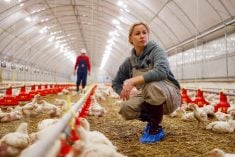CHICAGO (Reuters) — Wal-Mart Stores Inc. is pressing meat, seafood, dairy and egg suppliers to reduce the use of antibiotics, becoming the first large retailer to take a stand against the excessive use of drugs in raising farm animals.
The guidelines announced on Friday would limit suppliers to using antibiotics to treat and prevent disease and not for promoting growth, a controversial practice by livestock producers. The move comes against the backdrop of growing concern that over-use of antibiotics in animals can spawn drug-resistant superbugs, endangering human health.
Read Also

B.C. ostriches culled, CFIA confirms
Ostriches on an embattled Edgewood, B.C. farm have been culled after a prolonged legal battle, the Canadian Food Inspection Agency has confirmed.
Wal-Mart, the country’s biggest food retailer, is also telling suppliers not to raise animals in gestation crates or in other conditions considered inhumane.
While the rules are not mandatory, the retailer is asking suppliers to its roughly 5,200 Wal-Mart and Sam’s Club stores in the United States to publically disclose their use of antibiotics and treatment of animals on an annual basis.
Wal-Mart is now the second U.S. major company to press meat suppliers on the issue. In March, fast-food giant McDonald’s Corp. said its U.S. restaurants would stop buying chicken raised with human antibiotics in two years.
Advocates welcomed the move and said it would likely pressure other food retailers to follow suit.
“They’re the first ones who have asked for this sort of use data and to make it public. We haven’t gotten that from anyone else, including the U.S. government,” said Gail Hansen, senior officer for Pew Charitable Trusts’ antibiotic resistance project.
In 2013, the U.S. Food and Drug Administration released guidelines for drug makers and agricultural companies to voluntarily phase out antibiotics as a growth enhancer in livestock.
But the extent to which U.S. meat producers are using such drugs is not publicly known. The U.S. Agriculture Department has said it is planning to begin collecting more detailed data on antibiotics used on farms, a potential precursor to setting targets for reducing use of the drugs in animals.
Wal-Mart said the decision to demand greater transparency from its suppliers was rooted in consumer demand. It cited an internal study that showed 77 percent of its customers would increase their trust and 66 percent were more likely to shop from a retailer that ensures humane treatment of livestock.
“Our customers want to know more about how their food is grown and raised and where it comes from. As the nation’s largest grocer, Walmart is committed to using our strengths to drive transparency and improvement across the supply chain,” Kathleen McLaughlin, senior vice-president of Walmart sustainability, said in a statement.
Tyson Foods Inc., the largest U.S. poultry producer, said in April that it planned to eliminate the use of human antibiotics in its chicken flocks by September 2017.
However, Sanderson Farms Inc., the third largest U.S. poultry producer, said on Wednesday that it planned to continue using antibiotics on its birds, partly because there are no alternatives on the horizon for treating a deadly but common gut disease.














